
How AI and Machine Learning Are Revolutionizing Travel Apps?
Travel planning has changed a lot from the days when you had to flip through brochures or call travel agents. Just thinking about it now feels exhausting, isn’t it? In today’s digitally-dependent world, we cannot even imagine planning a trip like Christopher Columbus which took six long years. Nowadays, planning a trip is easier than ever, all thanks to the rise of next-gen travel apps and websites. With just a few clicks, you can organize your entire journey without breaking a sweat.
But what’s fueling this transformation? Well, the answer lies in the integration of AI and Machine Learning in travel app development. These technologies aren’t just adding fancy new features, but they’re fundamentally changing how these apps work.
The impact of AI and Machine Learning on travel apps is huge, offering benefits that are hard to ignore. In this blog, we’ll explore how these technologies are reshaping the way we plan and experience travel.
7 Ways In Which AI and ML Transform Your Travel App
If we look back, AI in travel started with simple recommendations. AI’s ability to sift through mountains of data to offer personalized travel plans is impressive- and it’s easy to see why travelers love it! But AI and Machine Learning can do so much more than just suggest destinations. Here’s the inside scoop on how these technologies can completely transform your travel app:
1. Round-the-clock Customer support
In this fast-moving world, it is time-consuming to wait in a queue to have your issue resolved. Users these days, refrain from using apps and websites that take a lot of time in answering query tickets. So, what could be the best way to make customers choose you over your competitors?
Well, the answer is in the title of this blog- it is the incorporation of AI and Machine Learning in travel applications that can make round-the-clock customer support easy and efficient
.
How? Well, we all know that the traveling industry is running 24/7, but so are AI-powered customer services. This technology guarantees that support is available at all times, day or night. AI-powered chatbots provide immediate responses to all queries. Machine Learning, on the other hand, learns from user behavior and provides tailored responses, making the experience even more user-friendly. Not only that, these technologies make booking hotels and flights easy.
2. Dynamic Pricing
Travelers often spend hours searching for budget-friendly hotels and flights. To do away with this problem, next-gen technologies like AI and Machine Learning step in to resolve the issue and help users and businesses alike by using dynamic pricing.
Dynamic pricing, in other words, is real-time pricing, and as the name suggests, it is a pricing strategy for businesses and online travel agencies to automatically adjust travel costs in real-time when the market demands shift. This is to help hotels maximize both occupancy and revenue per room.
But, how does the Dynamic pricing feature help travelers? Well, travelers can benefit from AI-powered dynamic pricing as it enables travel apps to compare hotel prices and receive notifications about potential price increases due to local events.
3. Travel Safety
AI and Machine learning technologies provide the perfect solutions for safer travel. They can monitor all security issues from payment systems to fraud detection, and can allocate resources to make travel safe and easy.
By using advanced analytics and predictive modeling, AI and Machine Learning can detect potential risks and frauds, allowing businesses to address security threats and ensure the safety of travelers.
And when it comes to payments, travel apps, and websites handle a lot of transactions, which makes them easy fraud targets. AI and Machine Learning technologies identify fraud patterns and recommend the safest payment method, making payment systems fast, secure, and easy to use.
4. Sending Alerts
Won’t you prefer receiving a heads-up before any delay happens? Well, this is where AI and Machine Learning come in. These technologies can power a travel application to send alert notifications and pop-ups to travelers about flight and hotel status, inform them about weather and traffic conditions, and send them updates about their planned events.
Developing travel applications can be so robust if one can consider incorporating AI and Machine Learning technology, as it enables to send alerts to the users about the rise or fall in the price of hotels and flights. But it doesn’t end here, travel apps can also be used as event planners, and AI technologies power the application to alert users about the events of their day, so they don’t miss out on any fun. Machine Learning on the other hand records the data and suggests tailored responses on similar upcoming events during the trip, hence, maximizing user experience.
5. Accessibility
Your travel application must be accessible to a wide range of users if you want to expand your user base. We agree that it is a difficult task to develop such an application but it can increase your users tenfold. This, in turn, will not only help businesses but will also gain the trust of specially-abled users while traveling.
For example, you can integrate AI to help visually impaired travelers navigate through airports or have a text-to-speech feature for people with hearing disability or speech impairments, making travel easy for everybody.
Conclusion
By monitoring and analyzing mountains of data, these technologies offer personalized recommendations, budget-friendly planning, safe travels, and even advice for travelers to make eco-friendly and ethical choices. All while making sure that users don’t miss out on any fun and receive round-the-clock customer support.
So, if you want to boost your travel business, you should harness the power of these technologies and hire a travel app development company to create just the application for you and ensure a seamless travel experience for your users.






